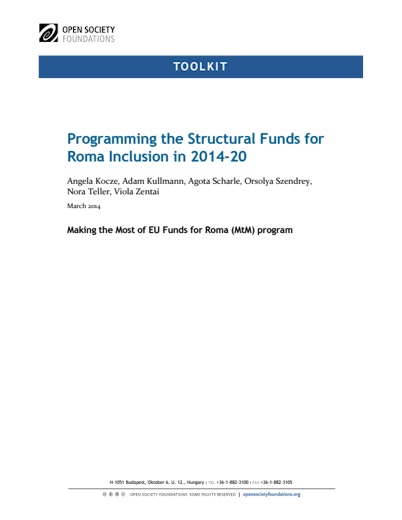The new 2014–20 EU budget period is the first to start with Roma inclusion high on the European agenda. The regulations on EU funds, adopted in December last year, create favorable conditions for launching ambitious policy reforms benefiting equality and Roma inclusion with support from EU funds.
The relevant national level operational programs, to be finalized and adopted in the coming months, should take advantage of these favorable conditions and commit to policy reforms, such as investing in early childhood development; providing quality, desegregated education services that equip disadvantaged children for labor market participation; providing personalized employment services that are able to address multiple disadvantages; and strengthening access to primary health care services for marginalized communities in remote areas.
Operational programs should also commit to changes in structures and procedures allocating EU funds, e.g., by setting up strong equality policy units, using simplified cost options, and launching global grants and capacity-building services.
The Making the Most of EU Funds for Roma program of the Open Society Foundations contributes to the programming of Structural Funds for Roma Inclusion with this toolkit. The aim of the toolkit is to assist public authorities involved in the programming by describing not just what should be done but also how these can be done.
Download
-
Programming the Structural Funds for Roma Inclusion in 2014–20 (3.1 Mb pdf file)
Download the toolkit.
Read more
Voices In Depth
Inside the Archives: George Soros and the Fight for Roma Dignity

For over 40 years, George Soros has been the leading private supporter of Europe’s Roma—the continent’s largest and most excluded ethnic minority—championing Roma leaders in their fight for equality and against deep-rooted discrimination.
Roma Rights
A New Roma-led Vision of Power

The new, independent, Roma Foundation for Europe is backed by a €100 million pledge that builds on Open Society’s over 30 years of support for Roma causes.
Roma Rights
Q&A: A Step Toward Justice for Roma Women

In November, the Slovak Republic formally apologized to Roma women for a program of forced sterilizations that stretched out for decades. How a Slovak human rights group helped hold the government accountable.
